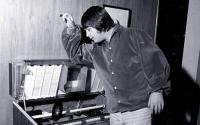2 September 2005Julian Borger
Irma Plummer, the mayor's emergency coordinator, had tears in her eyes and her voice was breaking as she asked God to help Baton Rouge.
"You have reminded us of how strong you are and we yield and acknowledge that," Ms Plummer said, her eyes tightly shut.
"Right now, Father, we pray first for your protection and your grace which is unceasing and unfailing ... I don't even know what to ask for today, Lord. I don't even know what will beset us today."
Around her, Baton Rouge's civic leaders, men and women in blue, grey and khaki uniforms, held hands and bowed their heads, their faces lit from below by the array of computers in the municipal emergency operations centre.
Their troubles were written on the wall above them. A list of 13 emergency shelters, with a total capacity of 10,000 people all had the word FULL written alongside them.
Louisiana's state capital, itself recovering from Hurricane Katrina, is being inundated by the human wave coming from the submerged city of New Orleans. Overnight, Baton Rouge doubled in size from a quarter to half a million.
Councilman Mike Walker stood up and spelt out what the writing on the wall meant.
"The Baton Rouge we lived in and grew up in is no longer. These people are here to stay, because they have nowhere to go, and they'll have nowhere to go back to for years," said Mr Walker, a big 56-year-old man, who said he had seen "nothing like it in my life".
He added: "Instead of water flooding in, we've got people flooding in. The people levee has broken."
In the city outside, the human tide was rising visibly. The streets were full of displaced people roaming in groups, and the city authorities were showing signs of nerves.
Police armed with shotguns and automatic rifles cleared out a city government centre and the surrounding streets near the biggest refugee centre, in a show of force apparently aimed at deterring looting and unrest, but which also served to stoke unease.
Baton Rouge officials were yesterday trying to change the electronic information boards along the motorway leading from New Orleans in the east, so that they would inform incoming travellers that the city was full.
Part of the problem was well-meaning motorists. "Everyone who has a vehicle is picking people up on the causeway and dropping them in town," said the police chief, Jeff Leduff. "Last night, we had 3,000 people turn up at LSU [Louisiana State University, now serving as a medical centre].
"We may have to barricade our hospitals. We put up barricades on the River Centre [the biggest relief station] to say there is no more room."
At LSU, helicopters were landing on a sports field to ferry in more casualties. Jamie Roques, the medical coordinator of a clinic set up for people with special needs, said: "It's like nothing we've ever seen."
As many were heading to Texas, authorities there were reported to be turning back refugees hoping to shelter in the Houston Astrodome sports arena.
The human waves emanating from New Orleans were sweeping back and forward across the state in the search for a haven, and in the process, Louisiana was being swamped.
http://www.guardian.co.uk/international/story/0,,1561151,00.html






